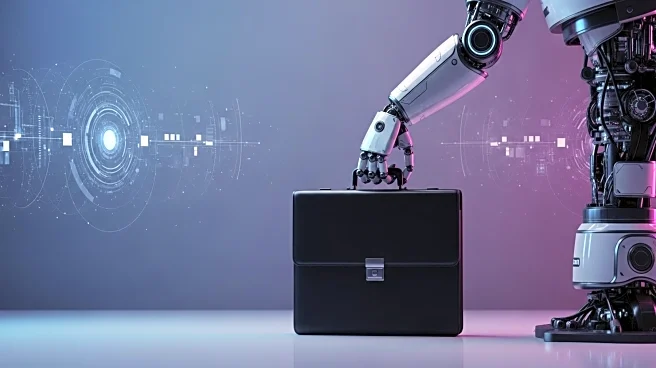What is the story about?
What's Happening?
A report released by Senator Bernie Sanders highlights the potential impact of artificial intelligence and automation on the US job market, predicting the loss of nearly 100 million jobs over the next decade. The analysis, based on findings from ChatGPT, suggests that AI and robotics could significantly affect various sectors, including healthcare, transportation, and education. Specifically, the report estimates that 40% of registered nurses, 47% of truck drivers, 64% of accountants, 65% of teaching assistants, and 89% of fast food workers could see their jobs eliminated. The report underscores the rapid pace at which AI could reshape the economy, contrasting it with historical technological revolutions that unfolded over longer periods.
Why It's Important?
The potential job losses due to AI and automation could have profound implications for the US economy and workforce. As major companies like Amazon and Walmart already implement automation, the report raises concerns about the concentration of wealth and power among corporate leaders investing heavily in these technologies. The shift could exacerbate economic inequality, with workers in manufacturing, transportation, and other sectors facing significant challenges. The report calls for increased regulation and worker protections, such as a reduced workweek and a 'robot tax' on companies adopting automation, to mitigate the impact on affected workers.
What's Next?
The report has sparked debates in Washington regarding AI regulation and the need for protective measures for workers. Senate Democrats are advocating for stricter regulations and policies to safeguard jobs, while the Trump administration emphasizes the importance of leading global AI development. The ongoing discussions may lead to legislative proposals aimed at balancing technological advancement with economic stability and worker rights.
Beyond the Headlines
The ethical implications of AI-driven job displacement are significant, raising questions about the responsibility of corporations and policymakers in managing technological progress. The concentration of wealth and power among a few individuals investing in AI could lead to broader societal shifts, necessitating a reevaluation of economic and labor policies to ensure equitable growth.















